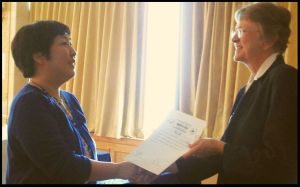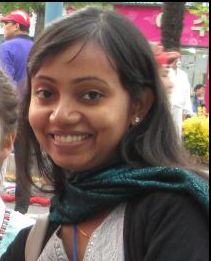
Kumi Soejima receiving the GAF4 Best Paper Award from Meryl Williams. Photo: Piyashi Debroy
Report by Dr NIKITA GOPAL, Chair Program Committee

Piyashi Debroy, winnder of GAF4 AquaFish-CRSP Best Student Paper Award
The 4th Global Symposium on Gender in Aquaculture and Fisheries (GAF4) was successfully held during the 10th Asian Fisheries and Aquaculture Forum, Yeosu, Korea (April 30-May4, 2013).
The GAF4 was held from May 1 to 3, 2013. In all the Program had 4 technical sessions where researchers, academicians and students presented 25 papers. Each presentation was followed by discussions and there was lively interaction by the participants. The lone poster for GAF4 was ‘Anthropological study of the gender role in the Japan Miyazaki fishing village’ by Sun-ae Ii. A special plenary talk on ‘Rich aquaculture –poor fishery communities – Growth, equity and gender in coastal communities’ was delivered by Bodil Maal of NORAD.
Four special workshops were also organized as part of GAF4.
- NORAD-NACA WORKSHOP ON MAINSTREAMING GENDER IN NACA: How can the Network of Aquaculture Centres in Asia-Pacific (NACA) mainstream gender into its work program and what strategies can it develop to achieve this? As NACA approaches its 25th year and examines its future directions, this facilitated workshop will examine how this important regional inter-governmental body, comprised of the world’s largest aquaculture producing countries, can address gender in its ongoing and planned programs and regional partnerships. Dr. Ambekar E. Eknath, Director General of NACA presented an overview of the work done by NACA.
- ASEM AQUACUTLURE PLATFORM FOCUS GROUP DISCUSSION ON FUTURE RESEARCH NEEDS: What are the most important areas to cover in ASEM (Asian-Europe Meeting) future research (methodology, subjects of interest, types of beneficiary) concerning gender and aquaculture. The paper ‘Malaysian experience in implementing gender workshop on empowering vulnerable stakeholders in aquaculture’ by Tengku Aizan H,Jariah, M., Zumilah Z., and Mohamed Shariff, M.D. was presented before discussions on the topic.
- GENDER RESEARCH METHODS ROUNDTABLE: Qualitative and Quantitative methods in gender research and writing gender papers eg: research design for comparative analysis of seaweed farming and gender. Dr. Marilyn Porter gave an overview of ‘Feminist methodology and fisheries science’. The paper presented by Dr. Taiwo Mafimisebi ‘Comparative Profitability of Women Dominated Fish-Based Livelihood Activities in Ondo State, Nigeria’ was taken up for further discussion on methodological issues in gender research.
- WOMEN, GENDER NETWORKS AND ASSOCIATIONS FOR AQUACULTURE AND FISHERIES: To explore why establishing and maintaining women and gender in fisheries and aquaculture networks and interest groups has proven difficult in all countries and regions. From experience, lessons learned, better understanding the needs and challenges, and brainstorming new pathways, explore options for future action in research, advocacy and development support.
- Dr. Meryl Williams presented the ‘AFS Gender and Fisheries Networking Experiences: What Works, What Doesn’t Work’ (authored by Meryl J Williams, Poh Sze Choo and M.C. Nandeesha). Angela Lentisco presented ‘Lessons learnt: Mainstreaming gender in the Regional Fisheries Livelihoods Programme (RFLP)’.
All the workshops were well attended and evinced great interest among participants.
As part of the GAF4 two Awards of $500 each were announced for the GAF4 Best Paper and one for GAF4 Best Student Paper sponsored by AquaFish CRSP
CONGRATULATIONS!!!
Kumi Soejima GAF4 BEST PAPER – for her paper on Women and Elderly Person’s Roles and Changes in Oyster Aquaculture in Japan
Piyashi Deb Roy GAF4 BEST STUDENT PAPER – for her paper Importance of Mangrove Conservation And Valuation To Women – A Case Study In Pichavaram Mangroves In India (co-authors R. Jayaraman, Keith R. Criddle and M. Krishnan)
The Organizing Committee also recognizes with appreciation and thanks the generous support from AquaFish CRSP and NORAD-NACA for Travel Grants which enabled participants to attend the GAF4 at the 10AFAF.
